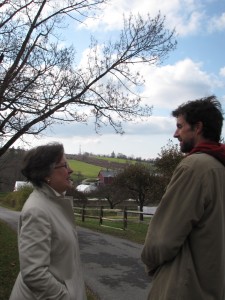Putnam County farm is innovation hub

Tucked away in a quiet corner of Putnam, one of the county”™s largest farms is keeping agricultural innovation alive as well as encouraging a growing appreciation for fresh foods.
Glynwood Farm was the brainchild of the Perkins family, who bought the 2,500-acre property in the 1920s and planned for its future well before “conservation” became such a popular buzzword.
Attorney Judith LaBelle met with family descendants who wanted to ensure Glynwood and its property would remain as it was when purchased. With 2,275 acres of the original parcel dedicated to what is now Clarence Fahnestock State Park, its remaining 225 acres remain farmland. With LaBelle”™s extensive background in land use and preservation, the family asked her to run Glynwood Farm as its president when it was established in 1995. An endowment created by the Perkins family helps sustain the 225-acre tract.
Dave Llewellyn was a law student who traded in a suit and briefcase for blue jeans and work boots to join Glynwood”™s farm team as its community supported agriculture program manager.
“The nature of a CSA is to have a steady supply, so several plantings are done at different times to spread out the risk. A CSA also involves people who buy shares of the harvest and share in the bounty ”“ or the bust ”“ that the farmer takes. We had a very dry July and a very wet August this year ”“ so the areas of the farm that are flat were already saturated when Hurricane Irene and Tropical Storm Lee hit … the crops just could not breathe.
“I had 100 tomato plants under a hoop house that weren”™t affected by the storm. So for the CSA share owners, they received a bounty of tomatoes, averaging about 3½ pounds a week for 15 weeks. That bought a lot of forgiveness when the storms wiped out other crops that would have been part of their CSA share. We wanted to keep the program running through December, but this year, we”™ll have our last pickup for Thanksgiving.”
The CSA concept is being embraced by more and more small and mid-size farmers as a way to remain viable. “Even though our CSA members knew this was not going to be a bounty year for them, we received many encouraging responses,” Llewellyn said. “They are truly our partners and it”™s an important relationship.”
Those considering starting a CSA “should start out small, because they may not be financially viable for a while,” he said. “When I came here four years ago the program had just been established and had 20 members. We are now up to 94 ”“ our CSA is not ”˜in the black”™ yet ”“ but we hope it soon will be.
“When I”™ve had a bumper crop year, I”™m able to sell whatever doesn”™t go to our CSA members to local restaurants. This year, that didn”™t happen, so there was no ”˜bonus”™ for us … but we did not bear the financial brunt that so many farmers did because our vegetables are grown strictly for CSA purposes. The storms were devastating, and many farms lost their entire crop. For us, our biggest loss was squash and potatoes.”
Every year, however, there is “renewed hope ”“ a new season ”“ maybe we”™ll be in the ”˜World Series”™ this year,” said Llewellyn. “We certainly are overdue for some mellow weather.”
The worst damage the farm itself sustained was the $100,000 in damage that Clove Creek caused when it became a raging river, taking the narrow road that leads into Glynwood with it.
LaBelle says its naturally grown vegetables, as well as its livestock and poultry, have helped put people back in touch with the land.
“Dave runs the apprentice program for beginning farmers, and we experiment with new farming methods. We are doing a rotational grazing of all the livestock and using solar powered electric fencing to manage the animals ”“ an intentional way to move them to reinvigorate the soil.”
Goats are also in abundance at Glynwood, LaBelle said. “We”™ve been able to recapture a lot of acreage that had been taken over by invasive wild roses and barberry; the goats love it. Reclaiming fields that have not been in production is just one example of the many programs and innovations we”™ve created to help sustain farmers.”
“It”™s exciting to be working in the area of sustainable food and farming,” she said. “I have been able to help land trusts, smart growth and planning organizations gain a clearer understanding of how important saving the land is and support the viability of farms.”
For the lawyer who grew up on a dairy farm in Wisconsin, LaBelle”™s come full circle, bringing with her a wealth of knowledge on how to preserve and protect one of the Hudson Valley”™s greatest assets ”“ its farmland.